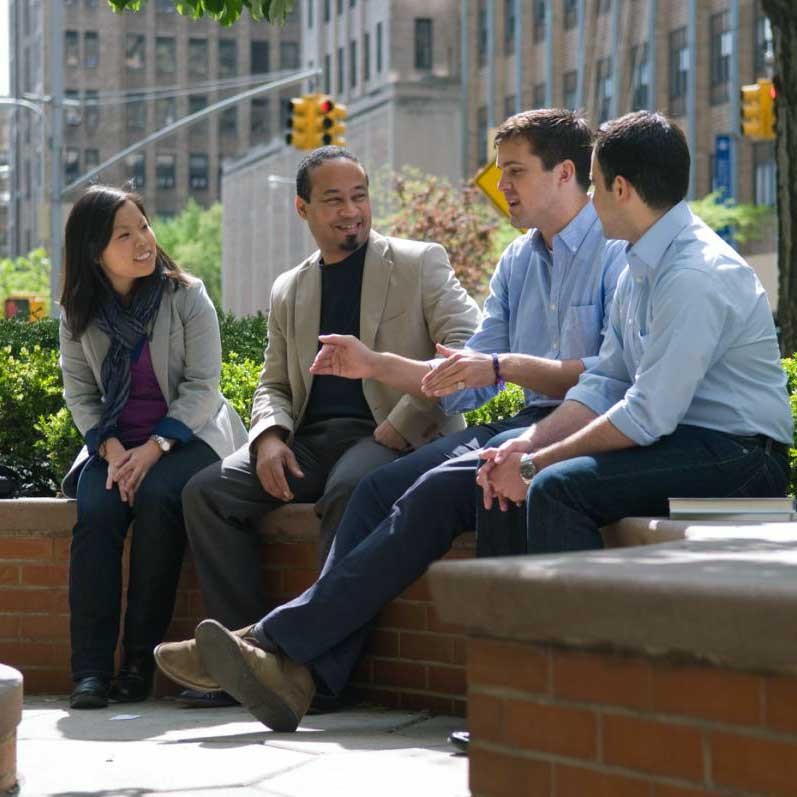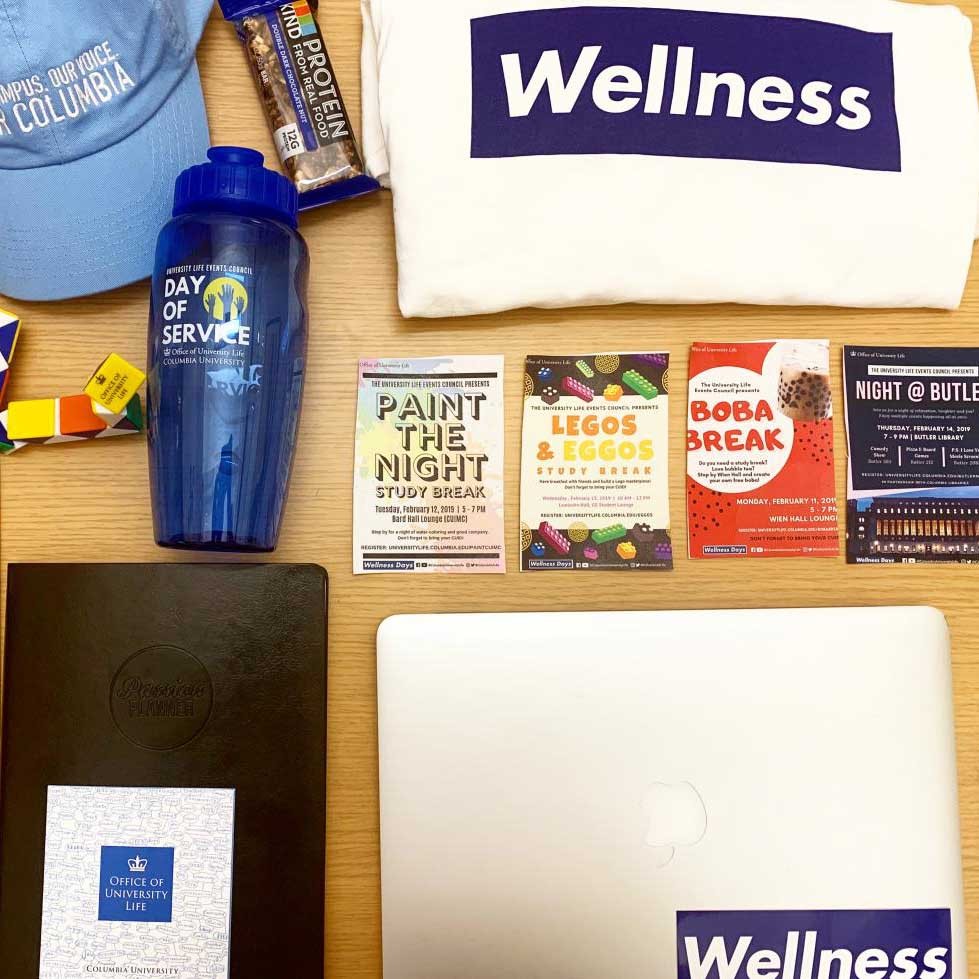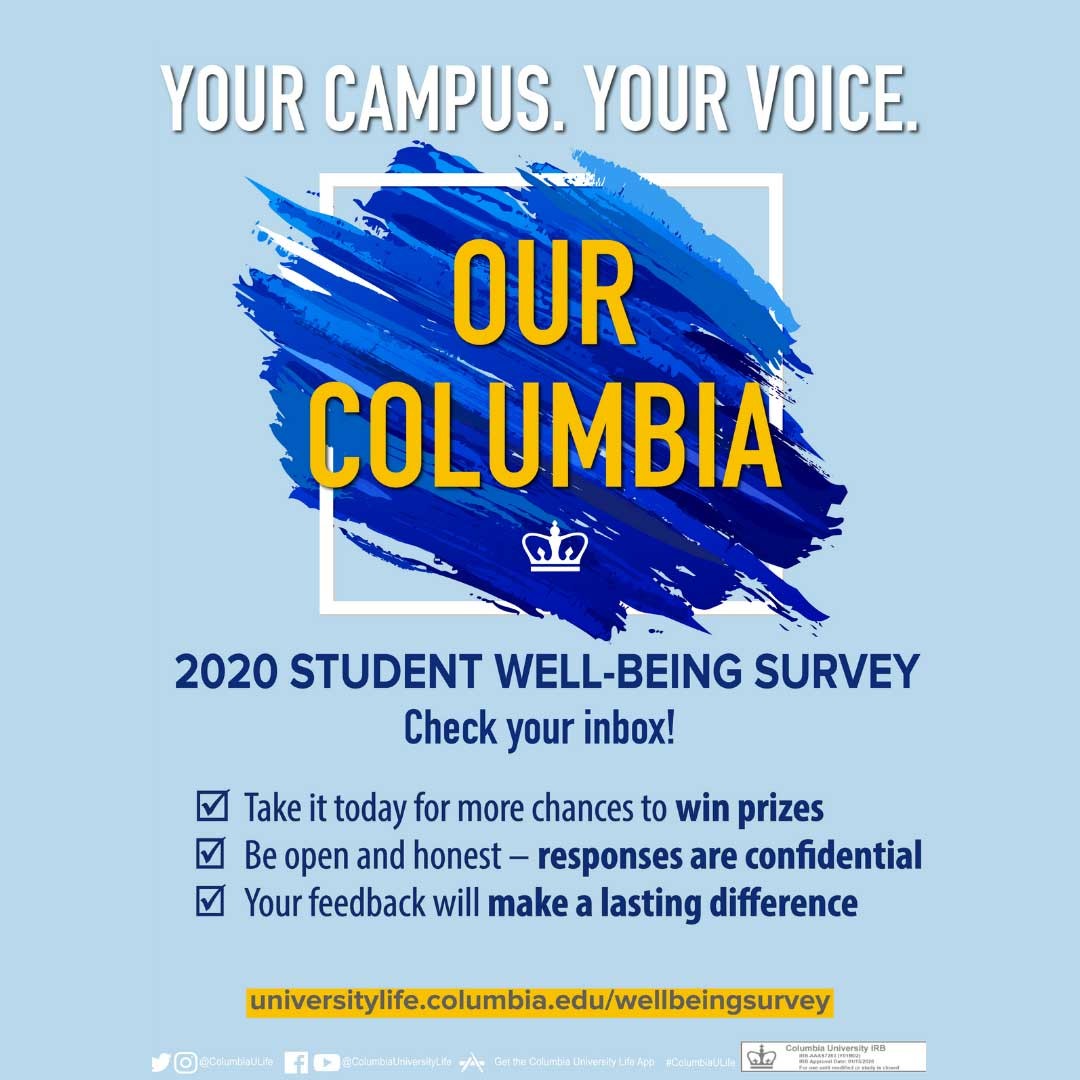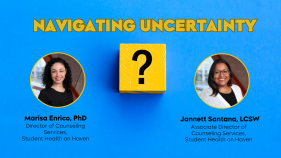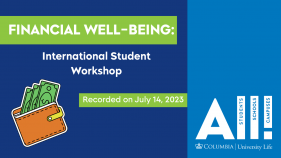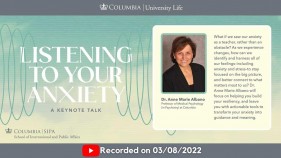As a member of the Columbia community, your well-being outside of the classroom is just as important as your academic success. Here are campus resources, programs and practical strategies for well-being to help you achieve a balance and adjust to your life as a Columbia student.
You can also contribute your ideas and energy to our University-wide focus on mental health, well-being and community on campus through initiatives like Wellness Days @ Columbia and the Student Well-Being Survey!
Well-Being Videos
November 27, 2023 - Many of us feel some level of discomfort with uncertainty, unpredictable events, and circumstances beyond our control. Led by clinicians from Student Health on Haven Counseling Services, this workshop explores tools that can help you navigate these moments and bolster your mental health.
July 14, 2023 - Learn about the U.S. banking system, how to develop a spending plan, and resources to support your financial well-being at Columbia. This workshop, hosted by Student Financial Services, University Life and the International Students and Scholars Office (ISSO), focuses on the specific needs of international students.
March 8, 2022 - In this keynote talk, Dr. Anne Marie Albano, Professor of Medical Psychology (in Psychiatry) at Columbia, focused on helping build resiliency, and provided actionable tools to transform anxiety into guidance and meaning. This event was in partnership with The School of International and Public Affairs.
Get information and tips on various wellness-related topics like nutrition, time management, sleep habits, relationships and more from Columbia University Irving Medical Center's Center for Student Wellness.
Get tips from the Center for Student Wellness on how to use meditation and mindfulness to reduce stress, anxiety and depression, and more. See also: Harvard Health Publications’ database on mental health and ways to keep your mind and mood in optimal condition here.
See an archive of previously asked questions on the topic of emotional health, answered by the team of specialists and professionals at Go Ask Alice!
Browse a library of over 3,000 mental and other health topics as described, illustrated and investigated by the New York Times, including in-depth articles on anxiety, depression, bipolar disorder, alcohol reliance and more.
Campus Resources
For trauma support and short-term counseling, referral for ongoing mental health services and student support groups.
Lerner Hall, 8th Floor
Broadway/115th
212-854-2878
For trauma support and short-term counseling, referral for ongoing mental health services and student support groups.
100 Hewitt Hall, 1st Floor
Broadway/116th
212-854-2092
For trauma support and short-term counseling, referral for ongoing mental health services and student support groups.
Haven Tower 1, Suite 1D
60 Haven Ave./169th & 170th
212-305-3400
With a pool, cardio equipment, a squash court, yoga and aerobics classes, lockers, showers and towel rental.
50 Haven, Level 3B
50 Haven Ave./169th & 170th St.
212-305-7010
Faith-based support and identity-based counseling, on-campus worship, and other programs; confidential counseling on a walk-in basis or by appointment.
710 Lerner Hall
Broadway/115th
212-854-1493
Provides and supports mentoring, advocacy, programming and education for intercultural communication, constructive interaction and mutual understanding.
510 Lerner Hall
Broadway/115th
212-854-0702
Alice! Health Promotion connects students with information and resources on a broad range of health-related topics.
John Jay Hall, 3rd Floor
114th/Amsterdam Ave.
212-854-5453 | Email
Free and confidential wellness appointments to help students find a solution-based approach to personal, academic and professional concerns.
50 Haven, Suite 107 and Room 101
50 Haven Ave./169th & 170th St.
212-305-3400
Offering a variety of fitness classes, an indoor running track, 25-yard pool, a multipurpose gym, cardiovascular and strength training equipment, showers, towel rentals and a sauna.
3030 Broadway
Broadway/118th
212-854-7149
Other Tools
Columbia Health and CUIMC Student Health Service offer external resources that are not diagnostic but are meant to be educational and to help you better understand behavior. Columbia does not endorse or accept responsibility for external websites.
Self-assessments from CUIMC Student Health Service
Take self-screening/online questionnaires about depression, anxiety, trauma, substance abuse, eating disorders and attention deficit and hyperactivity disorder. These do not substitute assessments with a mental health professional.
Headspace App
Described as, “a gym membership for the mind,” Headspace provides meditation techniques and exercises for a healthier and happier mind.
Sleep Assessment and Resources
Take an online sleep assessment to get real-time personalized feedback, start your own sleep diary, access sleep tips and resources, and send personalized sleep e-cards. From Alice! Health Promotion.
Alcohol Self-Assessment
Complete a quick online questionnaire and optionally participate in the Brief Alcohol Screening & Intervention of College Students (BASICS) one-on-one sessions, free and open to all Columbia University students.
Marijuana Self-Assessment
Complete a quick online self-assessment and get personalized feedback with the option to connect to campus health promotion professionals if you want to learn more.


